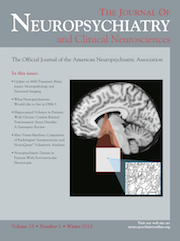To the Editor: Antipsychotic combination is a common strategy used in both bipolar disorder and schizophrenia, although just a few trials are available exploring its effectiveness.
1 We report herein the case of a patient suffering from severe Tourette syndrome (TS) and bipolar spectrum disorder who benefited from a combination of clozapine and aripiprazole.
Case Report
“Mr. FS,” a 39-year-old art-craft worker, had been suffering from TS since his early childhood. During the adolescence, TS was characterized by mouth opening and shoulder rotation, complex motor tics, such as trunk-bending or gyrating, screaming, and complex phonic tics. He was treated with pimozide 8 mg/day, which led to a complete remission of tics for about 20 years, although the clinical picture was complicated by the onset of mood shifts associated with impulsive behaviors and obsessions (numerical obsessions, rituals of order and symmetry, disproportionate aggressiveness).
In 2007, when he was 35, he visited us for a major depressive episode with suicidal thoughts, panic attacks, and agoraphobic avoidance. Paroxetine (20 mg/day) led to a fast improvement of mood and anxiety symptoms, albeit being ineffective on tics. Only transient responses were obtained with the association of various drugs (haloperidol, risperidone, olanzapine, amisulpiride) to paroxetine and mood stabilizers (valproic acid, 600 mg/day). After about 2 years of different combinations, a significant improvement was obtained with tetrabenazine 75 mg/day + clozapine 25 mg/day + valproic acid 600 mg/day and fluvoxamine 150 mg/day. This strategy had a good impact only on the affective and obsessive symptoms, while tics remained stable. Therefore, tetrabenazine, fluvoxamine, and valproic acid were tapered down. At the same time, aripiprazole (15 mg/day) was introduced, and, after about 1 month, we observed a dramatic improvement of TS symptoms. The improvement is still maintained at 2-year follow-up, so that currently the patient, who is regularly taking clozapine 25 mg/day and aripiprazole 15 mg/day with no significant side effects, shows a good affective balance, with no impulsive behavior, obsessions, or tics.
Clozapine is considered a standard treatment for schizophrenia and bipolar disorder,
2 whereas it has been reported to exacerbate obsessions and tics, although this topic is controversial.
3 The effectiveness of aripiprazole in bipolar disorder is well documented, and preliminary data do exist for its possible use in obsessive-compulsive (OCD) and related disorders.
4 Our case report highlights the possible usefulness of combining clozapine and aripiprazole in TS comorbid with bipolar spectrum disorders, perhaps due to the different and not overlapping pharmacological profile of these two antipsychotics. Aripiprazole has much higher affinity for D2 receptors than clozapine and, since it behaves as a 5-HT2A antagonist and 5-HT2C partial agonist, may have a robust anti-obsessional (and perhaps anti-tic) activity.
5Further controlled studies are necessary to investigate the benefits of antipsychotic polypharmacy in patients suffering from both bipolar and OCD spectrum disorders.

